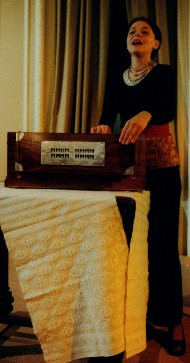
| BRAMA | Theatre | Events | Workshops | Translations | Series | Newsletter | Calendar | Store | Yara Home |

|
I wailed my heart out last weekend. In the vacant seventh-story room of an East Village building, I, with twenty other adventurous souls, was learning to sing ancient Ukrainian folk- songs. I am a Ukrainian-American woman, and a lover of music. I believe firmly in the curative powers of music: in the stirring properties of sweet melodies, the soothing potential of rich harmonies. After last Sunday, I can firmly assert my confidence in the therapeutic quality of pagan Ukrainian song. Forget chicken soup, try Ukrainian folk-singing for the soul. It was my second week in New York City, and I was still overwhelmed and over-stimulated by everything everywhere. Feeling adventurous, I trekked down to the Ukrainian folk-singing workshop that wintry Sunday afternoon with a friend (also Ukrainian-American). She had promised me that this workshop would be a nice break from adjustment to the city, and I had eagerly accepted her invitation. Nevertheless, we spent the subway ride down to the East Village skeptically predicting that the turnout would be poor, that the few participants would be wrinkly Slavic babas, and that the instructor would croak and croon at us unintelligibly. Instead, the workshop, sponsored by the East Village-based Yara Arts Group, drew a diverse crowd: a pair of young aspiring actresses, one from Spain, one from Italy; a Japanese-American performance artist; a trio of unrelated older men who thought they might have some Ukrainian cousins somewhere; a hip, be-pierced East Villager; a former leader of the Socialist Workers Party with an interest in post-communist countries; and a core group of Ukrainian-Americans, young and old. The instructor, Mariana, a young native Ukrainian woman who is the artist-in-residence for the Yara Arts group this season, was very supportive of our first hesitant sotto voce wails. She prodded us, this motley group of strangers, to sing "open-throated," without reservations, to move to the music if it moved us, and to forget about the words (ancient Ukrainian, easy to forget). With Mariana's charismatic encouragement, those first tentative whimpers soon became confident yelps, and the music, wild and foreign, soulful and rhythmic, swept us away. This, actually, was not my first encounter with Ukrainian folk-song. It had been introduced to me once before, in a quirky Ukrainian village called Rakhiv, in the heart of the verdant Carpathian mountains. I had come to Rakhiv on a whim, as part of an unstructured solo three-month trip to Ukraine. I had been invited to stay with a Peace Corp volunteer, Juniper, who was finishing her second year working with an environmental NGO in this isolated Carpathian town. I had come with no expectations, and with no knowledge of Rakhiv or its surprisingly well-preserved and vibrant cultural life. Rakhiv is a speck on the map of Europe, and a dot on the map of Ukraine. Nine kilometers from the Romanian border, and hundreds of years from New York City, it is a tiny town with a large distinction: it is the exact, mathematical, geographic center of Europe. The villagers are proud of this distinction, and a humble stone monument marks the precise central point of the continent, so that the few brave tourists who journey to Rakhiv can throw their arms around it and tell stories of when they embraced the center of Europe (I certainly do). But the true spark in each villager's eye ignites when he speaks of the resident Orchestra, Rakhiv's soul and spirit. Rakhiv is also the geographic heart of a region known as Hutsulshchynna, the southern mountainous part of Ukraine. The Hutsul culture is a vibrant one, complete with elaborate traditional costumes, exotic instruments, and wild, foot-stomping dances. It is rooted in the traditions of ancient nomadic mountain farmers, and it bears some similarities to the notoriously unrestrained culture of Gypsies who still tour Ukraine. The Rakhiv Hutsul Orchestra held its rehearsals in an abandoned school on the perimeter of the village, and this is where Juniper and I encountered them. The presence of two Amerikanochky, as we were affectionately called by Rakhivites, added to the excitement of the orchestra's rehearsal, as they showed off their instruments, costumes, and voices. The "orchestra" consisted of about two dozen musicians, and included a small army of sopilkas (a petite wood flute, capable of incredible acrobatics), a trio of chitarists (a xylophone-like stringed instrument, played with hammers and strapped to the player), a one-man percussion section, and a mysterious membranophone that was supposed to "pull vibrations out of the earth." Additionally, a choir of singers (who doubled as dancers) supplemented the instrumentalists, stomping and squealing about to the music. Outside it was deep summer, and children from the village flocked to the abandoned school and joined in the music. Soon, dancing circles sprung up, villagers and musicians and singers and dancers linked arms, and, before I knew it, I was improvising on the tambourine. There was a sense, when one watched the orchestra rehearse (and rehearsed with them), that one was witnessing a strange and beautiful accident: sounds, colors, and energy collided to produce a powerful sensual synergy. The dancing was reckless, riotous, and the music was remarkably seamless for its improvisatory style. But the voice was king: confident, emotional, and communicating nuances of raw joy and sorrow that are usually obfuscated by rules and convention in Western classical music. Occasionally, a soloist would step out and share a song of deep meaning to the rather large audience that had assembled. Frequently, these quiet, contemplative moments would metamorphose effortlessly into up-tempo dance music again, and the rehearsal, more like an impromptu performance, pushed and pulled the audience along. The rehearsal continued to weave along for a while, but slowly the crowd of participants subsided, and the musicians began to complain of the heat. After the rehearsal, Juniper and I approached the woman who seemed to be the star singer of the ensemble, and begged her to teach us to sing. She seemed flattered, and accepted our offer, but warned us that it is not a thing easily taught. I assured her that we would be understanding and devoted pupils, and we agreed to meet later that week. On the day of the lesson, Juniper and I eagerly prepared ourselves for folksinging, but our instructor never came. I thought for sure that I had missed my chance to learn to sing these rare Ukrainian folksongs, and left Rakhiv with that one regret. Leave it to New York City to find the one unusual art form that I had given up on, and to present it to me in workshop form. Mariana, the woman who energetically led us through the afternoon of singing at the Yara Arts Group workshop, had personally traveled to these isolated regions of Ukraine, collecting and recording ancient pagan songs on her way. In her repertoire she had songs from Hutsul regions along with songs from various other regional pockets of Ukraine. She had transcribed the songs personally, while learning to imitate the effects and inflections of the singers. And now she generously shared her findings with our eclectic group of interested strangers. I had suspected, from my first contact with ancient Ukrainian song, that it could have a potent healing, empowering, bonding effect. I still can't pinpoint the source of its magic, but I can attest to its existence now. Our group of interested strangers was transformed that afternoon. We had come as curious skeptics, and we left the workshop feeling liberated, having made friends, wanting to celebrate. A group of us moved to a local Indian restaurant, where we feasted and talked for hours. I returned to my new, unfamiliar room that evening and felt a calm that I had missed since my arrival in New York City, despite the ambulances and trucks rumbling down Amsterdam Avenue. That night, I thought about Rakhiv, my missed lesson, my unexpected afternoon, and the phenomenon of coincidence. Humming a pagan Ukrainian melody to myself, I prepared to wake up the next day and wail. For more information on Mariana's ritual song workshops for Yara's current activities see What's New |

|
Yara Arts Group
306 East 11th St., #3B
New York, NY 10003 USA
Phone/Fax: 212-475-6474
Email: yara@prodigy.net
Tell us what you think of our homepage!
|